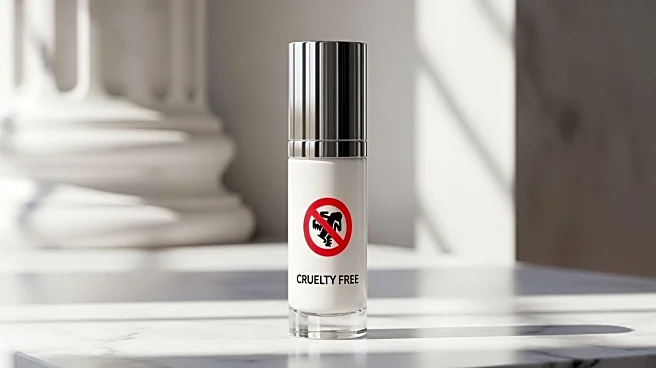What's Happening?
Industry leaders from the U.S. cosmetics and personal care sector gathered on Capitol Hill to advocate for key policy priorities. The event, organized by the Personal Care Products Council (PCPC), focused
on several issues including the reauthorization of the Over-the-Counter Monograph User Fee Act (OMUFA), implementation of the Modernization of Cosmetics Regulation Act (MoCRA), expansion of non-animal testing methods, and tariff relief. Karin Ross, PCPC's Executive Vice President of Government Affairs, highlighted the importance of modernizing the FDA's sunscreen review process and adopting non-animal testing methods. The industry is also closely monitoring upcoming FDA rulemakings under MoCRA, with a focus on fragrance allergen and Good Manufacturing Practices rules. Additionally, the PCPC is advocating for tariff relief on specialized ingredients and packaging to protect jobs and maintain domestic operations.
Why It's Important?
The beauty industry is a significant contributor to the U.S. economy, supporting 4.6 million jobs and generating $308.7 billion in GDP. The push for regulatory reforms and non-animal testing methods reflects the industry's commitment to scientific advancement and ethical practices. These efforts could lead to more efficient regulatory processes and align U.S. standards with international practices, potentially enhancing competitiveness in the global market. Tariff relief is crucial for maintaining the industry's supply chain and ensuring that U.S. manufacturers can continue to operate effectively. The advocacy for these changes underscores the industry's role in driving economic growth and innovation.
What's Next?
The industry is awaiting key FDA rulemakings under MoCRA, expected in late 2025 and early 2026, which will provide clarity on compliance requirements. The PCPC is actively engaging with policymakers to ensure that the regulatory framework remains clear and workable. The passage of the Humane Cosmetics Act and OMUFA reauthorization are immediate opportunities to advance non-animal testing legislation. As state-level bans on ingredients and labeling rules continue to emerge, the industry is concerned about the potential for conflicting policies that could undermine federal law. The PCPC emphasizes the importance of a unified, science-based framework to ensure consistent compliance across the industry.
Beyond the Headlines
The advocacy for non-animal testing methods highlights ethical considerations in product safety assessments, reflecting a shift towards more humane and scientifically advanced practices. The industry's focus on tariff relief and regulatory consistency also points to broader economic implications, as these measures could enhance the competitiveness of U.S. manufacturers in the global market. The emphasis on MoCRA's unified framework underscores the need for federal leadership in navigating complex regulatory landscapes, which is crucial for maintaining industry stability and growth.









